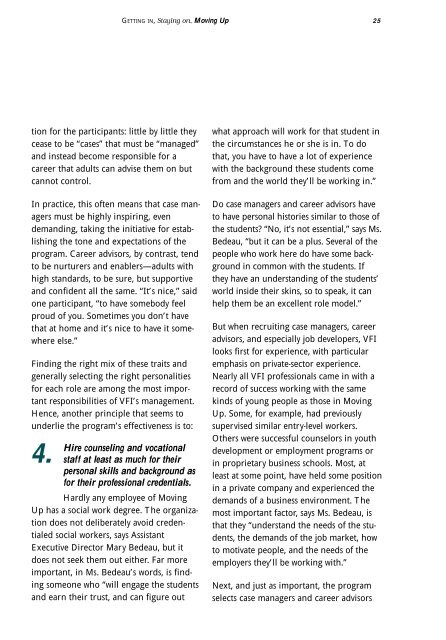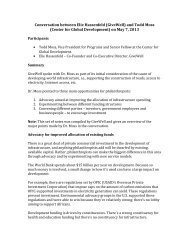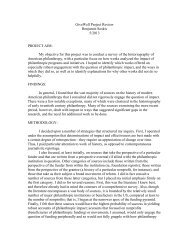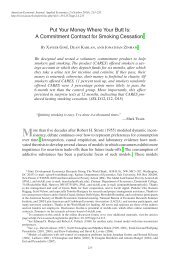Getting In Staying On Moving Up - GiveWell
Getting In Staying On Moving Up - GiveWell
Getting In Staying On Moving Up - GiveWell
You also want an ePaper? Increase the reach of your titles
YUMPU automatically turns print PDFs into web optimized ePapers that Google loves.
GETTING IN, <strong>Staying</strong> on, <strong>Moving</strong> <strong>Up</strong> 25<br />
tion for the participants: little by little they<br />
cease to be “cases” that must be “managed”<br />
and instead become responsible for a<br />
career that adults can advise them on but<br />
cannot control.<br />
<strong>In</strong> practice, this often means that case managers<br />
must be highly inspiring, even<br />
demanding, taking the initiative for establishing<br />
the tone and expectations of the<br />
program. Career advisors, by contrast, tend<br />
to be nurturers and enablers—adults with<br />
high standards, to be sure, but supportive<br />
and confident all the same. “It’s nice,” said<br />
one participant, “to have somebody feel<br />
proud of you. Sometimes you don’t have<br />
that at home and it’s nice to have it somewhere<br />
else.”<br />
Finding the right mix of these traits and<br />
generally selecting the right personalities<br />
for each role are among the most important<br />
responsibilities of VFI’s management.<br />
Hence, another principle that seems to<br />
underlie the program’s effectiveness is to:<br />
4.<br />
Hire counseling and vocational<br />
staff at least as much for their<br />
personal skills and background as<br />
for their professional credentials.<br />
Hardly any employee of <strong>Moving</strong><br />
<strong>Up</strong> has a social work degree. The organization<br />
does not deliberately avoid credentialed<br />
social workers, says Assistant<br />
Executive Director Mary Bedeau, but it<br />
does not seek them out either. Far more<br />
important, in Ms. Bedeau’s words, is finding<br />
someone who “will engage the students<br />
and earn their trust, and can figure out<br />
what approach will work for that student in<br />
the circumstances he or she is in. To do<br />
that, you have to have a lot of experience<br />
with the background these students come<br />
from and the world they’ll be working in.”<br />
Do case managers and career advisors have<br />
to have personal histories similar to those of<br />
the students? “No, it’s not essential,” says Ms.<br />
Bedeau, “but it can be a plus. Several of the<br />
people who work here do have some background<br />
in common with the students. If<br />
they have an understanding of the students’<br />
world inside their skins, so to speak, it can<br />
help them be an excellent role model.”<br />
But when recruiting case managers, career<br />
advisors, and especially job developers, VFI<br />
looks first for experience, with particular<br />
emphasis on private-sector experience.<br />
Nearly all VFI professionals came in with a<br />
record of success working with the same<br />
kinds of young people as those in <strong>Moving</strong><br />
<strong>Up</strong>. Some, for example, had previously<br />
supervised similar entry-level workers.<br />
Others were successful counselors in youth<br />
development or employment programs or<br />
in proprietary business schools. Most, at<br />
least at some point, have held some position<br />
in a private company and experienced the<br />
demands of a business environment. The<br />
most important factor, says Ms. Bedeau, is<br />
that they “understand the needs of the students,<br />
the demands of the job market, how<br />
to motivate people, and the needs of the<br />
employers they’ll be working with.”<br />
Next, and just as important, the program<br />
selects case managers and career advisors

















